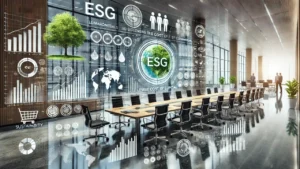This transformation is giving rise to impact sourcing—the practice of procuring goods and services from suppliers that intentionally hire and uplift individuals from marginalized or underrepresented communities. Simultaneously, supplier diversity is being redefined, not just in terms of ownership (e.g., women- or minority-owned businesses), but also in terms of workforce inclusion, social justice outcomes, and economic empowerment.
This article explores the evolution of impact sourcing and supply chain diversity in the ESG era, explaining the frameworks, performance indicators, compliance drivers, and strategic benefits businesses must consider in 2025. It also outlines how companies can embed socially responsible sourcing into procurement strategy, reporting systems, and stakeholder value creation.
Understanding Impact Sourcing: Beyond Conventional DEI
1.1 What Is Impact Sourcing?
Impact sourcing is the practice of intentionally awarding contracts or building supply relationships with organizations that create employment opportunities for underserved or vulnerable populations. This includes:
- Individuals from low-income or rural communities
- Refugees or conflict-affected populations
- Persons with disabilities
- Youth from underrepresented backgrounds
- Long-term unemployed or displaced workers
Unlike traditional diversity procurement programs, which focus primarily on supplier ownership demographics, impact sourcing measures the social outcomes generated by a supplier’s labor practices.
In practice, this could mean:
- Partnering with BPO firms in emerging markets that prioritize inclusive hiring
- Procuring goods from cooperatives employing women artisans in post-conflict regions
- Selecting logistics providers that offer training and employment to disabled workers
Impact sourcing thus transforms procurement into a tool for social inclusion and community development, while remaining aligned with business goals.
1.2 Why It Matters in 2025
With ESG now viewed through a broader lens of just transitions and inclusive capitalism, supply chains are under pressure to demonstrate not just low emissions, but also high social value. Governments, financial institutions, and consumers increasingly expect:
- Transparent disclosure of labor standards and hiring practices across supply chains
- Evidence of economic empowerment for marginalized communities
- Alignment with SDG 8 (Decent Work) and SDG 10 (Reduced Inequalities)
Moreover, procurement leaders are beginning to recognize that impact sourcing is not a philanthropic add-on, but a viable model for achieving workforce stability, risk diversification, and supplier innovation.
Regulatory Drivers and ESG Disclosure Expectations
2.1 Regulations Increasing Supply Chain Accountability
In 2025, multiple jurisdictions have enacted or expanded regulations requiring companies to assess and disclose the social impact of their supply chains. Key instruments include:
- EU Corporate Sustainability Due Diligence Directive (CSDDD): Mandates human rights and labor rights due diligence in supply chains.
- UK Modern Slavery Act (Expanded): Requires annual reporting on efforts to prevent forced labor and trafficking.
- German Supply Chain Act (LkSG): Requires companies to monitor human rights and social standards among Tier 1 and, in some cases, Tier 2 suppliers.
- US SEC Human Capital Disclosure Rules: Emphasize transparency on workforce composition, labor practices, and DEI.
In parallel, ESG disclosure standards (e.g., GRI 414, CSRD S2, SASB) are enforcing the need to quantify and report:
- Supplier labor standards
- Workforce inclusion metrics
- Social impact generated through procurement
Businesses that fail to provide credible, traceable data risk regulatory penalties, public backlash, and exclusion from ESG indices and investment vehicles.
2.2 ESG Frameworks and Reporting Indicators
Impact sourcing and supply chain diversity are now reflected in leading ESG reporting frameworks:
Table 1: Key ESG Indicators for Impact Sourcing and Supplier Inclusion
Framework | Indicator | Description |
GRI 414 | Supplier Social Assessment | Percentage of new suppliers screened for social criteria |
CSRD S2 | Equal Opportunity in the Value Chain | Disclosures on workforce inclusion and anti-discrimination policies |
SASB (Sector-Specific) | Labor Practices in Supply Chains | Sector-relevant metrics on contractor standards, diversity, and fair wages |
ISO 20400 | Sustainable Procurement | Integration of sustainability in procurement strategy and performance |
WEF IBC Metrics | Community and Inclusive Value Creation | % procurement spend with inclusive or impact-oriented suppliers |
Operationalizing Impact Sourcing: Procurement as an ESG Lever
3.1 Defining Strategy and Setting Targets
To operationalize impact sourcing, companies must begin by embedding inclusion into their procurement strategies. Key steps include:
- Mapping supplier base to identify gaps in social impact, diversity, or equity.
- Defining targets (e.g., % of total spend through impact suppliers; number of inclusive jobs created).
- Developing category-specific sourcing strategies that prioritize high-impact opportunities (e.g., logistics, catering, customer support).
- Creating supplier qualification criteria that include social outcome indicators.
Leading companies now treat impact sourcing targets as part of their enterprise ESG KPIs and integrate them into executive scorecards and annual sustainability reports.
3.2 Supplier Engagement and Capacity Building
Many suppliers—particularly small and mid-sized businesses—lack the tools or knowledge to meet ESG expectations. Companies pursuing impact sourcing must invest in:
- Supplier ESG onboarding that clarifies expectations, standards, and reporting processes.
- Capacity-building programs that offer training on labor rights, inclusion, and data tracking.
- Collaborative procurement models where large buyers co-develop social programs with suppliers.
This ensures that ESG uplift is not extractive, but inclusive—delivering long-term value for both buyers and vendors.
3.3 Tools and Technologies
Digital tools are enabling real-time tracking of social impact across supply chains. Examples include:
- Blockchain-based traceability for labor compliance
- Digital supplier scorecards integrated with ESG metrics
- AI-driven procurement platforms that assess social risks and recommend diverse suppliers
- Interactive dashboards showing procurement spend distribution by impact category
These systems not only improve transparency—they also allow ESG teams to generate investor-grade disclosures and support assurance requirements.
The Business Case: Impact Sourcing as a Value Driver
4.1 Risk Mitigation and Compliance Readiness
Socially responsible supply chains reduce exposure to:
- Reputational damage from labor rights violations
- Legal liabilities under due diligence and slavery laws
- Operational disruptions from poor working conditions or unethical subcontracting
Companies with inclusive sourcing models are better equipped to pass ESG audits, qualify for government contracts, and meet the procurement standards of sustainability-linked loans or bonds.
4.2 Innovation and Market Expansion
Impact suppliers often bring local knowledge, cultural insight, and product innovation. Tapping into marginalized communities opens doors to:
- New customer bases
- Localized product design
- Enhanced community loyalty and brand equity
In emerging markets, inclusive supply chain models are often the fastest path to economic resilience and shared value.
4.3 Employee and Consumer Alignment
Procurement decisions increasingly affect internal and external brand perception. Employees—especially younger ones—want to work for companies whose values align with their own. Consumers, too, are rewarding brands that deliver transparent, equitable supply chain narratives.
Impact sourcing is thus emerging as a cross-cutting differentiator across HR, brand, and operations.
The IFRSLAB Perspective
At IFRSLAB, we help companies design and implement socially responsible procurement strategies that are not just ethical—but ESG-compliant, auditable, and scalable.
Our services include:
- Mapping supplier ecosystems and evaluating social impact potential
- Developing inclusive procurement strategies aligned with CSRD, GRI, and ISO 20400
- Designing traceable reporting systems for impact sourcing metrics
- Training procurement teams and suppliers on ESG risk and reporting
In 2025, supply chains are no longer blind spots—they are strategic ESG assets. And impact sourcing is the lens that ensures they deliver not only value—but values.
Let’s build it into your business, and for more useful information click here.





